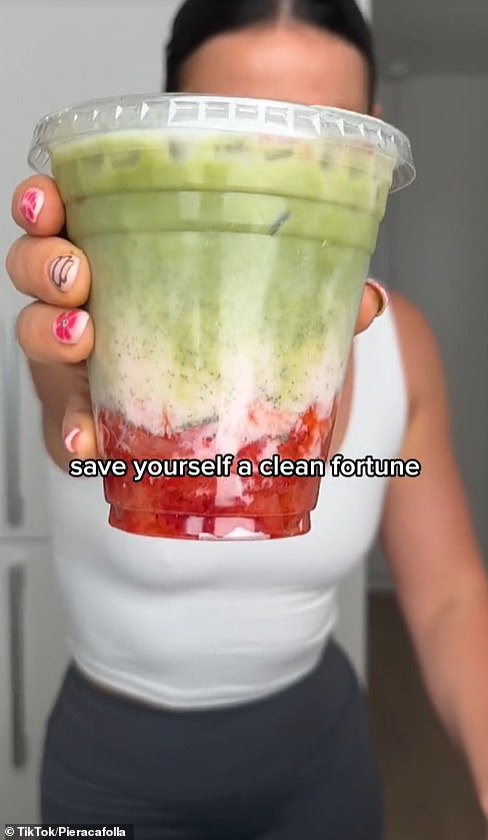It’s become the ultimate signal of wellness, often spotted in the hands of fit women picking up a treat after pilates; or in the course of an influencer’s ‘day in the life’ TikTok video as an essential start to their morning.
Matcha is certainly the ingredient of the hour, with coffee chains around the world offering versions of the caffeine drink for their customers and adding twists.
With its vibrant green hue and the promise of releasing caffeine over a longer period of time as opposed to the sudden hit of coffee, the drink, made from powdered green tea, is something everyone wants to try.
However as influencers and customers around the world race to get their hands on matcha drinks, reports have emerged that the global demand may have led to a shortage of the plant from which matcha is made.
The powder derives from the Camellia sinensis plant, which is grown in Uji, near the Japanese city of Kyoto, the supply of which declined last autumn, according to the Guardian.
While in Japan (where the drink has been consumed for centuries) the demand for matcha has declined, the rest of the world has woken up to the ingredient.
Global sales of matcha are expected to nearly double from £2.2bn in 2023 to £3.9bn by 2028.
The publication reports that Japan produced more than 4,000 tonnes of matcha in 2023; which was three times the amount it had produced in 2010.
After reports of a shortage emerged towards the end of last year, Kyoto introduced purchase limits on the powder.

Matcha fans may be missing their favourite drink in the near future after the city of Uji, near Kyoto, where the plant is produced, reported a shortage last autumn. Matcha has recently become a popular product among influencers (pictured)
Two of Japan’s biggest tea companies, Ippodo and Marukyu Koyamaen, announced unprecedented purchase limits on matcha products.
It’s reported that this year’s tea harvest, which begins this month, will top up the supply of matcha around the world, but with demand continuing to soar around the world, it’s likely that shortages will continue long-term.
Matcha, which was originally introduced in Japan by Chinese monks as early as the 12th century, is made by using a tea whisk to mix the powder into hot water.
Proponents say the tea can boost the brain’s health, due to its high concentration of polyphenols, chlorophyll, caffeine and L-theanine.
However, as the drink has become popularised in the West, drinkers and coffee shops have put their own spins on the tea, offering versions mixed into lattes, iced varieties and with added syrups and flavourings.
In the past year alone, sales of matcha products in the UK have doubled.

Matcha, which is produced by grinding up green tea into a powder, has been the ingredient on everyone’s lips in recent years

TikTok content creators including Lauren Herbert (pictured) have raved about their favourite matcha drinks online
Sage-green coffee chain Blank Street caused a storm with its blueberry matcha drink, which can be served both iced and hot, which sent fans wild when it was first introduced to the menu.
Similarly, Starbucks offers matcha lattes and iced matcha lattes; including a new lavender flavour which has been introduced for the spring menu.
A TikTok content creator from the north of England, Lauren Hebert, recently revealed her love of the iced strawberry matcha drink from Starbucks in a clip.
Speaking in her car while carrying her trendy vibrant green drink, she declared herself ‘officially a strawberry iced matcha girlie’ and said she ‘craves’ the ‘delicious’ drink all the time.
Influencers galore show off their tips and trips for making the best matcha at home in glossy TikTok videos, including one content creator based in London who calls herself the ‘caffienated cat mum’ who shares her recommendations for the best matcha powders available.
Similarly, Piera Cafolla, a chef on TikTok, recently revealed her recipe for a protein strawberry matcha iced milkshake – claiming she could save her viewers a ‘fortune’ if they copied her recipe.
However, despite the drink enjoying a sharp increase in popularity, mounting evidence suggests too much can trigger iron deficiency. Left untreated, this can raise the risk of severe infections as well as life-threatening heart failure.
Iron, found in red meat and a variety of vegetables, is crucial for the production of red blood cells, which transport oxygen to the organs. It is also vital for a healthy immune system.
Experts now say that drinking just one matcha tea a day could cause problems.
Research suggests teenage girls, pregnant and post-menopausal women are at the highest risk of a matcha-related iron deficiency.
‘People need to be aware of the potential risks of this drink,’ says Dr Jeannine Baumgartner, an expert in nutrition and researcher at King’s College London, who has studied matcha. ‘There is a real danger of a deficiency, particularly for younger women who have higher iron needs.
It has long been known that green tea can, in some cases, trigger an iron deficiency.
This is because it contains high levels of tannins – a compound which gives tea its bitter flavour.
Research shows that tannins attach to iron molecules in the digestive system and prevent them from being absorbed.
A major review of over 150 studies in 2010 published by the Journal of Chinese Medicine found that consumption of more than three cups of regular green tea a day reduced iron absorption. However, it is believed that matcha has an even greater effect, as one cup has nearly seven times as many tannins as a similarly sized green tea.
As well as the tannins, caffeine has also been shown to reduce iron absorption and, per gram, matcha can contain up to four times as much caffeine as coffee.
Experts say this means that even one matcha a day could have health impacts.
‘Matcha is much more problematic than green tea, as it is more concentrated so affects iron absorption even more,’ says
Prof Baumgartner. ‘Even one cup, if it is poorly timed, either during or up to two hours after a meal, will affect your iron levels.’






